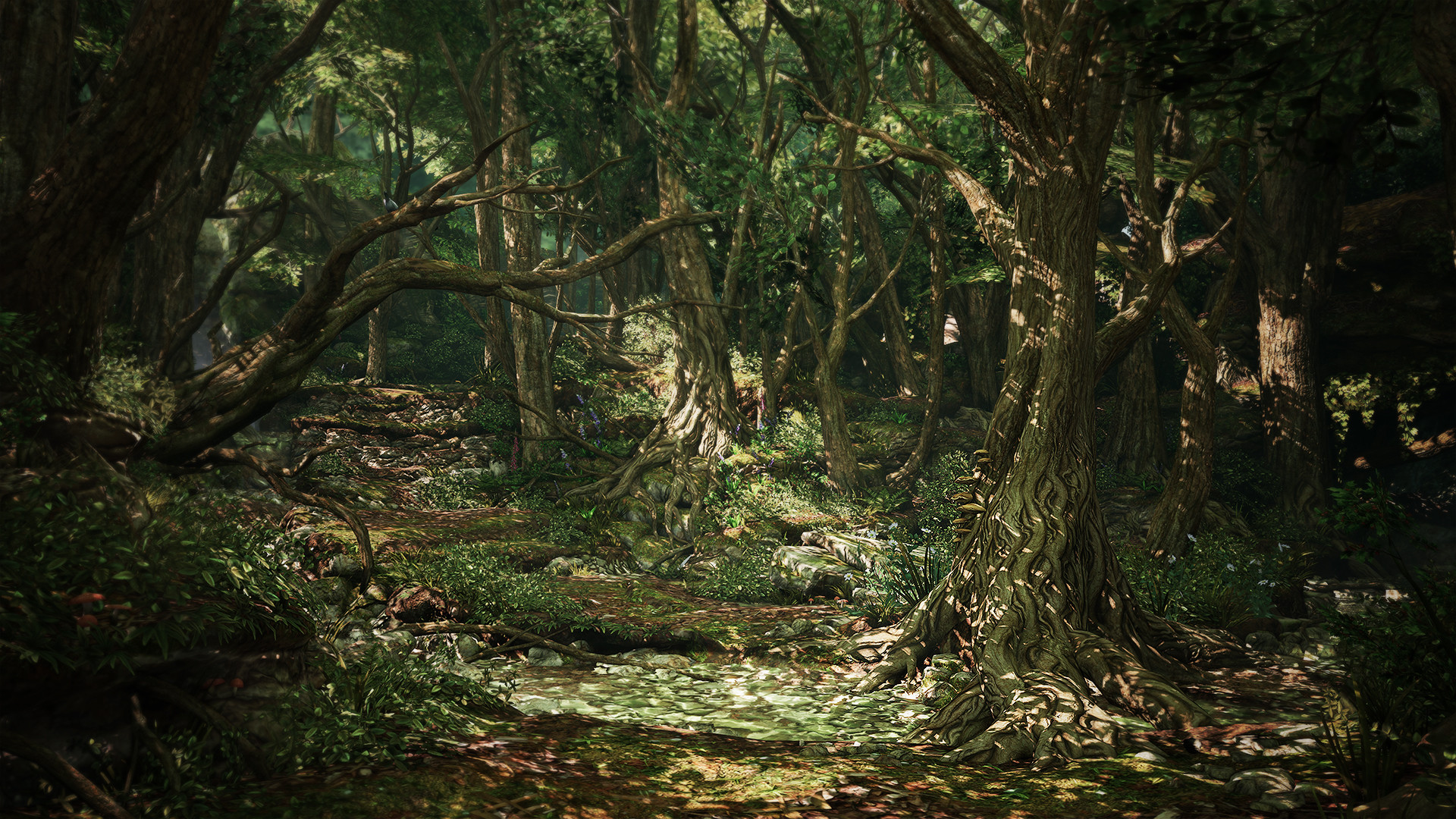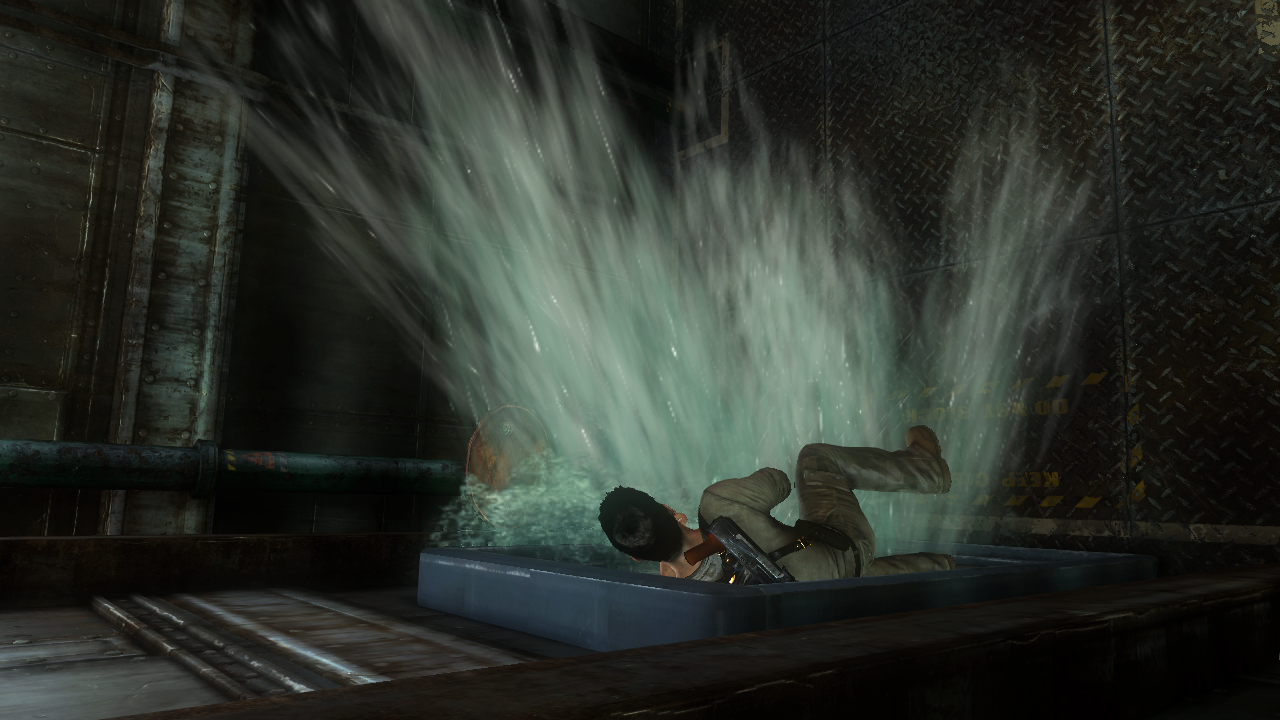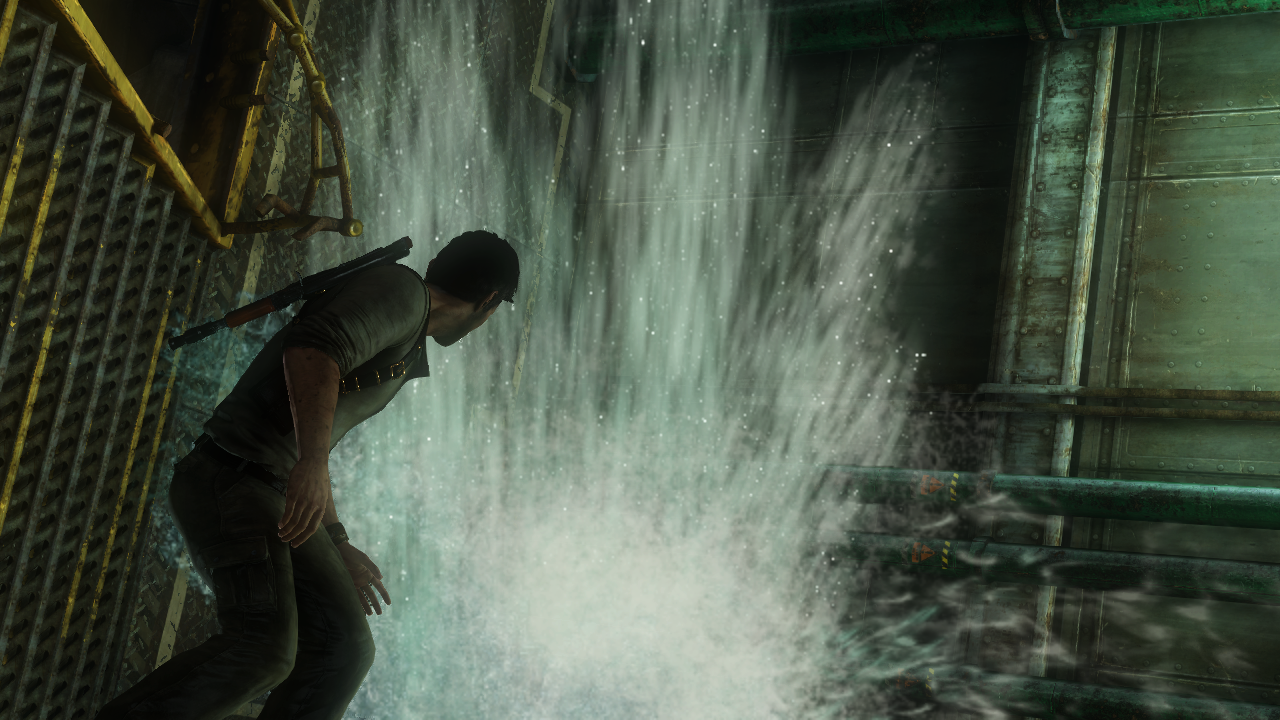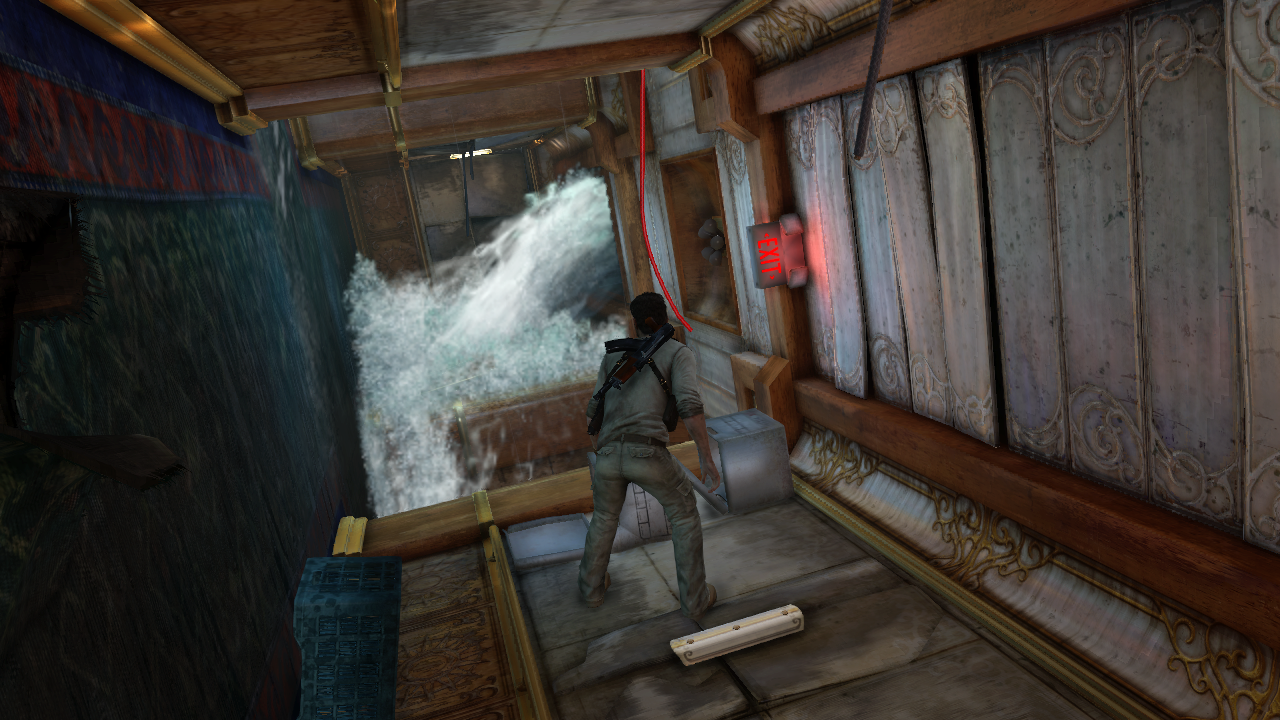-
Hey, guest user. Hope you're enjoying NeoGAF! Have you considered registering for an account? Come join us and add your take to the daily discourse.
You are using an out of date browser. It may not display this or other websites correctly.
You should upgrade or use an alternative browser.
You should upgrade or use an alternative browser.
Proprietary hardware for consoles was ass, actually
- Thread starter 64bitmodels
- Start date
- Opinion Analysis
cireza
Banned
I get your point overall. However this here is incorrect. If anything, it was much easier to make 2D games on Saturn (since it had hardware design to do this, and it was overall the same as previous consoles in that regard) than on PS1 and N64 which only targeted 3D.2D games for the Saturn were difficult to make
And PS2 picture always looked like ass, we did not have to wait for HD TVs.
Last edited:
THE DUCK
voted poster of the decade by bots
Op doesn't seem to fully grasp the idea that cheap consoles where doing things not found elsewhere at a reasonable price. (Or in some cases even did things not found on pc at all)
Same even holds true on modern consoles to some degree, you couldn't build a pc that could do what a series x or ps5 could do for the same price.
Same even holds true on modern consoles to some degree, you couldn't build a pc that could do what a series x or ps5 could do for the same price.
Last edited:
Danny Dudekisser
I paid good money for this Dynex!
While I agree with most of the sentiment, you come across as a bit of a cunt.
Shakka43
Member
They ported God of War 3 and The Last of Us just fine to the PS4 so I don't see why it would be that hellish to port them for PC. The only reason we haven't seen other PS3 games ported I imagine is a financial issue, Sony most likely don't see them returning a good profit.Sony will keep getting closer to PC given their desire for PC ports. Could you imagine the job to port a game built for PS3 natively to PC? Ooff…
Silver Wattle
Gold Member
I think Sony did custom hardware right for the PS1 and PS2; Going forward I can't see custom hardware being very beneficial, as even the PS5's SSD hasn't lived up to the hype, though I think custom operating systems have made the most difference even on off the shelf~ish hardware.
SoloKingRobert
Banned
Ahh, remember the old days when every console had their own hardware and wasn't just a PC stuffed into a box! When engineers actually put their love and soul into a console and it resulted in industry defining hardware and architecture?
Nah, me neither. Proprietary hardware for consoles actually kind of sucked.
The Sega Saturn, what should have been a slam dunk for Sega considering how much of an innovator they were in the 3d video game scene, with titles such as Virtua Fighter, Daytona USA and Virtua Racing. The company that produced some of the most impressive eye candy arcade games in the early 90s, who was leagues ahead of every other company in the jump to 3d gaming. But then they got infected with the retard virus, and went with a totally weird, obscene, complex design that they expected everyone to understand and utilize. 2D games for the Saturn were difficult to make, and 3D games moreso.
The N64 had the exact same problem and while 3D games looked and played far better on the N64 than they did Saturn, the cartidge based storage format, all the expansions, and in general a confusing architecture is why the Saturn and N64 languished in the PS1's success. It was a simple and easy to develop for architecture with CDs for all the developers storage needs, and it's one of the many reasons for the PlayStation's success.
Not to mention both the N64 and Saturn are notoriously difficult systems to properly emulate thanks to their retarded architecture making reverse engineering them a bitch. N64 guys specifically got so fed up they decided it'd be easier to DECOMPILE the games and port them to PC. With Jak getting a decompilation as well, seems like the same thing is happening to the PS2. Which is good, because the PS2 is also a terribly engineered system.
"buh buh my 155 million units sold" shut the fuck up. It was engineered poorly as Sony focused all of their efforts on the 'EmOTIoN EngINe" and as a result that system was significantly harder to make games for than the PS1, and was weaker than the competition to boot. While the Xbox and Gamecube's visuals have aged gracefully on HDTVs thanks to their adoption of progressive scan over interlaced, the PS2 being weaker resulted in it using 480i which looks like SHIT on HDTVs today. Not to mention just like N64 and Saturn it falls into the category of being a bitch to emulate. Needs a shitton of power and a bunch of patches and graphical fixes for everything since the PS2's GPU rode the short bus and had their own special way of doing things. But hey, at least the hardware was unique and all the games weren't using that gosh darn industry leading Unreal Engine 5!
Or how about the PS3's Cell, an idea which sounded badass and awesome on paper! Power your console using a supercomputer processor, therefore you can have all the powerful processing and calculations you needed for the advanced games coming out at the time. It's genius!
It WAS genius... if you liked worse performance on games than 360 and expensive prices due to hardware being far harder to produce. Oh yeah, can't forget the fact that OVER 17 YEARS LATER Sony STILL can't find a good way to get PS3 games emulated on PS5 thanks to the fucking abysmal system design. even if RPCS3 is a thing that exists, the fact that the system's OWN CREATORS can't reverse engineer it to work with future hardware is just sort of proof that this whole proprietary hardware thing was fucking stupid.
"ah, but the engines. Everything using UE5 will make games all look the same!"
First of all, the new Spongebob game uses the same UE5 engine that's powering some of the most realistic looking games on earth. It's not the engine that determines the way a game looks, it's the developers art direction and vision for the game. Second of all... Forspoken came out a couple months ago with a totally new custom engine. Looks generic, plays generic, main protagonist speaks like they're a Marvel character, and the game fucking killed the studio who worked on it. Custom engines don't make a game automatically good.
In reality, every console using X86 is nothing but a good thing, and every gaming using either UE or Unity is also a good thing. Ports are identical to the one on the other console, games are easier to make, and even if they don't 'code to the metal' like they used to, games still look better than ever with more advanced systems and algorithms powering the stuff you play today. Unreal Engine allows better looking games to be made than ever while still giving the developer full artistic control over their project, and games STILL have varied artstyles.
Let's leave Cell and Emotion Engine in the past, people.

kurisu_1974
is on perm warning for being a low level troll
What I liked was that at least games would look different on each console. The same game on Genesis or SNES, or Atari 800 and C64, would look and sound very differently based on the hardware it was running on. Sometimes they'd even be completely different games.
Now everything is just running on PC architecture.
Now everything is just running on PC architecture.
existensmaximum
Member
I have rarely seen a thread with an opinion that I disagree so wholeheartedly with. Whatever.
kuncol02
Banned
Problem of PS3 wasn't cell, but weak GPU they thrown into console in last moment because dual Cell architecture wasn't fast enough and split memory (which by the way was standard at that time)Or how about the PS3's Cell, an idea which sounded badass and awesome on paper! Power your console using a supercomputer processor, therefore you can have all the powerful processing and calculations you needed for the advanced games coming out at the time. It's genius!
Lysandros
Member
(They are also reaping the benefits of it) This is why they tried to make the Tempest Engine as CELL like as possible?Sony is still paying the price of the Cell architecture more than a decade later.
Lysandros
Member
PS5 has quite a bit of custom hardware in it besides the I/O, what's the basis for seeing the Cache Scrubbers as not "very beneficial" for example?I think Sony did custom hardware right for the PS1 and PS2; Going forward I can't see custom hardware being very beneficial, as even the PS5's SSD hasn't lived up to the hype, though I think custom operating systems have made the most difference even on off the shelf~ish hardware.
winjer
Gold Member
For a while, it was the only way to go, because PC hardware was to big and expensive.
For example, the Pentium (P5) had one third of it's die being used by microcode. On a console, where every transistor counts, it would be cost prohibited.
With time, the percentage of the die on an X86 chip became inconsequential. So using X86 on a console became an easy choice.
A similar thing happened with OoO execution. It uses die space, so most companies preferred to have in-order CPUs, and rely on programmers and compilers.
But with time, the percentage of die space was not so critical, and with game code becoming increasingly complicated, OoO became very important.
In the case of GPUs, consoles adopted PC GPUs much earlier, because these were dedicated for 3D acceleration. PowerVR was one of the first making a PC GPU for consoles. And it could have been 3Dfx.
Soon after it was nvidia making the GPU for the original Xbox. And ATI making the GPU for the Gamecube. And then lthe list goes on.
For example, the Pentium (P5) had one third of it's die being used by microcode. On a console, where every transistor counts, it would be cost prohibited.
With time, the percentage of the die on an X86 chip became inconsequential. So using X86 on a console became an easy choice.
A similar thing happened with OoO execution. It uses die space, so most companies preferred to have in-order CPUs, and rely on programmers and compilers.
But with time, the percentage of die space was not so critical, and with game code becoming increasingly complicated, OoO became very important.
In the case of GPUs, consoles adopted PC GPUs much earlier, because these were dedicated for 3D acceleration. PowerVR was one of the first making a PC GPU for consoles. And it could have been 3Dfx.
Soon after it was nvidia making the GPU for the original Xbox. And ATI making the GPU for the Gamecube. And then lthe list goes on.
RoboFu
One of the green rats
For a while, it was the only way to go, because PC hardware was to big and expensive.
For example, the Pentium (P5) had one third of it's die being used by microcode. On a console, where every transistor counts, it would be cost prohibited.
With time, the percentage of the die on an X86 chip became inconsequential. So using X86 on a console became an easy choice.
A similar thing happened with OoO execution. It uses die space, so most companies preferred to have in-order CPUs, and rely on programmers and compilers.
But with time, the percentage of die space was not so critical, and with game code becoming increasingly complicated, OoO became very important.
In the case of GPUs, consoles adopted PC GPUs much earlier, because these were dedicated for 3D acceleration. PowerVR was one of the first making a PC GPU for consoles. And it could have been 3Dfx.
Soon after it was nvidia making the GPU for the original Xbox. And ATI making the GPU for the Gamecube. And then lthe list goes on.
But also until the mid 90s PCs had horrible graphics processing compared to the nes/ snes/ sms/ genesis. These consoles had hardware made for graphics where as PCs couldn’t even do super Mario without some genius created algorithm that still had artifacts.
Last edited:
winjer
Gold Member
But also until the mid 90s PCs had horrible graphics processing compared to the nes/ snes/ sms/ genesis. These consoles had hardware made for graphics where as PCs couldn’t even do super Mario without some genius created algorithm that still had artifacts.
True. x86 was made for the professional market, mostly office work.
And neither Intel nor IBM knew it would become the industry standard.
In fact, they only expected to sell ~15k units, but it sold much more and became a running success. And nobody really knows why.
kurisu_1974
is on perm warning for being a low level troll
True. x86 was made for the professional market, mostly office work.
And neither Intel nor IBM knew it would become the industry standard.
In fact, they only expected to sell ~15k units, but it sold much more and became a running success. And nobody really knows why.
Isn't cheap clones the reason why?
Aaron Olive
Member
Read the first post….
This thread has been brought to you by

This thread has been brought to you by

Last edited:
winjer
Gold Member
Isn't cheap clones the reason why?
I'm talking about the very start of the X86. The first 8086.
This was an era when multiple CPU architectures existed concurrently, competing with each other, in several markets.
And the X86 was a quick,14 week project at Intel, based on an order by IBM. It was never supposed to become the mainstream CPU arch in the PC space.
It was meant to be a one off, to address one market space.
kurisu_1974
is on perm warning for being a low level troll
I owned a 8086 clone PC back in the day, so that's why I said it was the clones that made it popular.
Only real alternative back then was a much more expensive Macintosh.
Only real alternative back then was a much more expensive Macintosh.
winjer
Gold Member
I owned a 8086 clone PC back in the day, so that's why I said it was the clones that made it popular.
Only real alternative back then was a much more expensive Macintosh.
The popularity started even before the clone PCs. Intel and IBM were expecting to sell around 15K of these PCs with 8086, but ended up selling several times more in the first few months.
It was because of this success that then we started to have clone X86 PCs.
kvltus lvlzvs
Banned
i (kinda) wish i could go back, mates
kurisu_1974
is on perm warning for being a low level troll
The popularity started even before the clone PCs. Intel and IBM were expecting to sell around 15K of these PCs with 8086, but ended up selling several times more in the first few months.
It was because of this success that then we started to have clone X86 PCs.
400.000 actually. And the clone market already appeared six months later, because IBM used off the shelf parts instead of custom made propriety hardware.
64bitmodels
Reverse groomer.
Grew up with the 360 which ran on PowerPC, then the 3ds which ran on ARM and then Wii U using PowerPC as wellBefore I say how wrong the OP is, here is what I want to know: How old is the OP? Did he mostly grow up with these x86 boxes or was he there when consoles made the transition from 2D to 3D, when high definition became a thing, when cartridges became extinct, when bump mapping was big news?
Nowadays pretty much every system i still actively use is X86
.... is that not true though??? If the PS3 had trouble hitting 30fps how isn't it the fault of the hardware when the 360 which has a weaker CPU ran the games superior?This sounds like something a teenager would say: "I played a ps3 with games struggling to hit 30fps, therefore custom hardware is bad!" A modern console with custom hardware could absolutely be a viable option.
kurisu_1974
is on perm warning for being a low level troll
.... is that not true though??? If the PS3 had trouble hitting 30fps how isn't it the fault of the hardware when the 360 which has a weaker CPU ran the games superior?
I always understood that it was the weird architecture that held developers back, and made porting x86 content somewhat difficult. I don't think it was an issue with the actual, raw power of the PS3.
Sid Of Bee
Member
Well, I agree that certain companies engineered their products poorly and made missteps. I think you misunderstand the history of why proprietary chipsets were necessary for gaming.
To really piggyback on PC technology. Back then you were not going to get the leaps and bounds of performance dedicated to gaming that these proprietary chips were capable of.
Early consoles up until probably about the HD era benefited from well engineered proprietary hardware in order to keep costs down and focus on gaming related performance. Basically you could have a $200 to $300 console competing with a $1500 PC.
I mean look at the Famicom/NES which came out in 1983. Compare it to the Apple II or something like that. Heck even a Commodore 64. I mean compare it for gaming. And cost.
Only in the past 15 years would I say it's much more sensible to just scale PC architectures and mobile architectures for gaming platforms.
To really piggyback on PC technology. Back then you were not going to get the leaps and bounds of performance dedicated to gaming that these proprietary chips were capable of.
Early consoles up until probably about the HD era benefited from well engineered proprietary hardware in order to keep costs down and focus on gaming related performance. Basically you could have a $200 to $300 console competing with a $1500 PC.
I mean look at the Famicom/NES which came out in 1983. Compare it to the Apple II or something like that. Heck even a Commodore 64. I mean compare it for gaming. And cost.
Only in the past 15 years would I say it's much more sensible to just scale PC architectures and mobile architectures for gaming platforms.
rodrigolfp
Haptic Gamepads 4 Life
What a load of nonsense.
Silent Hill 2 PS2 soft shadows took 20 years to get ported on PC, Resident Evil 4 got worked on every single day for close to 10 years by arguably the best modding team in gaming history, and it's still missing GameCube effects. Cell allowed some PS3 exclusive games to look a good generation ahead of the competition:










Which, no matter how impressive recent Sony exclusive were, was absolutely not the case later on.
Uncharted 3 at times looks like a current generation game with its extensive use of (baked) global illumination, HDR, volumetric lighting, artifact-free ambient occlusion unlike SSAO on most current gen games, procedural and entirely real-time ocean affecting with real physics the entire cruise ship (and its hundreds of assets) serving as the player's playground, artifact-free reflections, clothing simulations, insanely high quality POM at times untouched by even most current gen games, high quality DOF, lots of samples for its per object and camera motion blur, the best sand simulation on any game on any platform to this day (with grains of sand falling into Drake's footsteps), some of the the most insane levels even seen in a game like the burning chateau, sinking ship and falling plane, all running at a stable framerate at the same native resolution of some Series S games.
Let's also not forget:
All of this, and much more, was very obviously only possible because of proprietary hardware.
Does it sucks we can't properly enjoy many games at their best today via emulation? Yes, sure, but not enough to trade what these games gave us at the time.
And every single one of those games could be much better on PC. Or you are saying that PS2, GC, PS3 all had some unique secret sauce?
Last edited:
DaGwaphics
Member
Depends, obviously, on how you look at it.
The old consoles were so purpose built that while they would have been absolute garbage at most computing tasks, they could often compete against much more expensive PC hardware at video games on day one. The consoles today are still an amazing price to performance option, but not quite to the level that they used to be.
Edit: @ S Sid Of Bee covered this already and in more detail, must read thread before posting. LOL
The old consoles were so purpose built that while they would have been absolute garbage at most computing tasks, they could often compete against much more expensive PC hardware at video games on day one. The consoles today are still an amazing price to performance option, but not quite to the level that they used to be.
Edit: @ S Sid Of Bee covered this already and in more detail, must read thread before posting. LOL
Last edited:
DW74
Member
NO U.shut the fuck up
fart town usa
Gold Member

Go home OP, you're drunk.
Vick
Member
Of fucking course they had.Or you are saying that PS2, GC, PS3 all had some unique secret sauce?
How is this even remotely in question? Want to disregard 20 years of developers statements?
Proprietary stuff in consoles was ok when development times were short (a few month or a year or two,...). But since last gen (ps4/xb1) you have often dev cycles of 5+ years. If you put your work into optimizing for proprietary stuff you game is out when there is already a new generation.
It just doesn't make any sense anymore.
It just doesn't make any sense anymore.
Rocco Schiavone
Member
Gotta love these stupid comparisons. Of course the PS2 was weaker. I tell you why It was released before the GameCube and the Xbox.


Last edited:
diffusionx
Gold Member
It was simply impossible to do some effects and other things on PC, or even on other consoles. The Xbox, which was basically a PC, couldn't do Silent Hill 2's fog because it used the unique capabilities (particularly bandwidth) of the PS2. Even the most recent round of console RE4 ports (to PS4, etc.) lacked some effects that were in the Cube version. I think the only other platform that had those effects was the Wii version, because of the similarities in architecture.And every single one of those games could be much better on PC. Or you are saying that PS2, GC, PS3 all had some unique secret sauce?
This is just a fact. Whether you want to call it secret sauce or whatever, it's the reality.
Last edited:
rodrigolfp
Haptic Gamepads 4 Life
No, they didn't. The problem with Silent Hill 2 and RE4 was the way they implemented some effects and didn't bother porting correctly, and not that other platform (PC) could not do them.Of fucking course they had.
How is this even remotely in question? Want to disregard 20 years of developers statements?
I said PC. I can't care less for Xbox and its limitations.It was simply impossible to do some effects and other things on PC, or even on other consoles. The Xbox, which was basically a PC, couldn't do Silent Hill 2's fog because it used the unique capabilities (particularly bandwidth) of the PS2. Even the most recent round of console RE4 ports (to PS4, etc.) lacked some effects that were in the Cube version. I think the only other platform that had those effects was the Wii version, because of the similarities in architecture.
This is just a fact. Whether you want to call it secret sauce or whatever, it's the reality.
Last edited:
thicc_girls_are_teh_best
Gold Member
OTOH, there are various systems with more off-the-shelf or generic solutions that still didn't succeed in the market, or didn't produce games matching the best of consoles with more proprietary designs in them. Dreamcast was easy to make games on, but even though the system had more performance left on the table than what we ended up seeing, I doubt a game pushing the Dreamcast to its absolute limit would've matched a game pushing the PS2 to its absolute limit, given everything we know on both systems. Devs just needed more time and experience to get up to speed with PS2, is all.
I think you're also misunderstanding some things here; PS2 being "weaker" than GC and Xbox isn't why it can only do 480i native; Dreamcast was weaker than PS2 and could output at VGA resolution. It was just down to Sony cheaping out on the video output port as they had allocated budgets elsewhere. Considering the average resolution and type of television in that era, 480i was more than acceptable if developers took some precautionary measures. Using a console's ease of emulation as an argument against its design is REALLY odd to me, because these consoles were never designed with friendliness to PC emulation ever being a priority. Why would a console manufacture in 1994 or 2000 care about making their system easy enough to emulate for PCs in 2023, when they A: could not have predicted what PC tech would be like in 2023, and B: would have hampered the scope of the design they could've made at the time to provide the best solution of easy-of-use/performance/price/scale for developers and customers?
I feel like that's punishing system designs in retrospect almost too harshly, because at the end of the day PC emulation is a nice-to-have, but it's not mandatory. There are ways to preserve the systems and their games that don't have to involve PC emulation, either, although that makes it easier.
Overall I'd say you're entitled to feel what you feel about Saturn, N64, PS2, PS3 etc. in terms of their design issues and even difficulty in emulating them, but using only that side to say proprietary hardware was always a bad idea is ignoring the cases where it DID lead to easier game development, more visually advanced and creative games in consoles that actually had very healthy lives commercially & critically.
rodrigolfp
Haptic Gamepads 4 Life
And putting half the DreamCast's VRAM, no?It was just down to Sony cheaping out on the video output port as they had allocated budgets elsewhere.
K.N.W.
Member
I'm unconvinced about this thread because PS4 actually has a separate BUS for the CPU to access the RAM pool, XBOX ONE has embedded fast memory for the GPU, PS5 has a custom RDNA architecture setup, Tempest Engine and Cache Scrubbers, XSX has a special memory configuration, both the systems have a dedicated Decompression and I/O block, and all of those magic tricks are unavailable on PC.
I would say that consoles are definitively using PC hardware, but the custom side of hardware still exists.
I would say that consoles are definitively using PC hardware, but the custom side of hardware still exists.
dcx4610
Member
I definitely have nostalgia for SNES vs. Genesis. It was a ton of fun and super interesting to buy one version (usually the SNES one) and rent the other version. Especially games like Street Fighter so you could hear the different music, see the color palette differences and experience the different gameplay with the controller and speed. It was also cool when different studios got their hands on games like Capcom for Aladdin on the SNES and Virgin for the Genesis. Wildly different games and different concepts and ideas.
That's just how tech was back then. You got different results with different hardware and it was fun to compare. Looking back on it with adult eyes, it's still fascinating but I have no patience for it now. As I mentioned in the Switch 2 post, consoles should be like PC and phones. Just because new hardware comes out shouldn't mean you lose access to your games/apps. It wasn't possible back then but with digital, there is really no excuse. If I buy Horizon on the PS4, it should work on the PS5 and eventually the PS6. Find an architecture and stick with it.
I don't think people are used to it yet but I think Microsoft has the right idea by just calling their games "Xbox" games. It's not an "Xbox One" game or an "Xbox Series X" game - it's just Xbox. Whatever Xbox you own, you can play it. Newer hardware can just run it better. I love how with PC gaming, a game I bought in 1998 worked on my PC back then, works on my current PC and will work on the next 5 PC builds I do over the years. It doesn't and shouldn't matter.
That's just how tech was back then. You got different results with different hardware and it was fun to compare. Looking back on it with adult eyes, it's still fascinating but I have no patience for it now. As I mentioned in the Switch 2 post, consoles should be like PC and phones. Just because new hardware comes out shouldn't mean you lose access to your games/apps. It wasn't possible back then but with digital, there is really no excuse. If I buy Horizon on the PS4, it should work on the PS5 and eventually the PS6. Find an architecture and stick with it.
I don't think people are used to it yet but I think Microsoft has the right idea by just calling their games "Xbox" games. It's not an "Xbox One" game or an "Xbox Series X" game - it's just Xbox. Whatever Xbox you own, you can play it. Newer hardware can just run it better. I love how with PC gaming, a game I bought in 1998 worked on my PC back then, works on my current PC and will work on the next 5 PC builds I do over the years. It doesn't and shouldn't matter.
ReBurn
Gold Member
They're not really using PC hardware, though. They're just derived from PC hardware architecture. By basing their APU designs on existing designs they save money, but they still customize them heavily. You're right that the SOC's and I/O in these boxes have been highly customized to make them good at the one thing they were designed to be good at. Console hardware is less exotic these days but it's definitely still custom.I'm unconvinced about this thread because PS4 actually has a separate BUS for the CPU to access the RAM pool, XBOX ONE has embedded fast memory for the GPU, PS5 has a custom RDNA architecture setup, Tempest Engine and Cache Scrubbers, XSX has a special memory configuration, both the systems have a dedicated Decompression and I/O block, and all of those magic tricks are unavailable on PC.
I would say that consoles are definitively using PC hardware, but the custom side of hardware still exists.
SF Kosmo
Al Jazeera Special Reporter
Back in the day there was no other option. You couldn't build an affordable console with standardized PC parts that would be either affordable or good at playing games.
Custom gaming-oriented silicon allowed game systems to throw around sprites and do smooth scrolling, with very limited, easily sourced CPUs. Comparably priced PC hardware would have really struggled with basic gaming graphics tasks and more capable PC hardware would have been way too expensive and harder to develop for.
By the early 2000s or so that was starting to change, and Microsoft's push toward more PC-like hardware paid off. But in 1994? That wasn't a thing, man. Custom silicon was the only way.
Obviously that doesn't justify every hardware decision made by the people designing these systems, but it wasn't like PC hardware offered a viable alternative either.
Custom gaming-oriented silicon allowed game systems to throw around sprites and do smooth scrolling, with very limited, easily sourced CPUs. Comparably priced PC hardware would have really struggled with basic gaming graphics tasks and more capable PC hardware would have been way too expensive and harder to develop for.
By the early 2000s or so that was starting to change, and Microsoft's push toward more PC-like hardware paid off. But in 1994? That wasn't a thing, man. Custom silicon was the only way.
Obviously that doesn't justify every hardware decision made by the people designing these systems, but it wasn't like PC hardware offered a viable alternative either.
rofif
Can’t Git Gud
ps5 is linux based or something. Chips are custom to a degree too.And now with X86 and AMD graphics in both console and PC, they still have issues porting games to PC.
So obviously it's not one button press away but for sure it's quite simple... yet they had to rebuild gow 2018 from sratch porting it from ps4... so maybe not easy
rofif
Can’t Git Gud
could be much better now. not thenAnd every single one of those games could be much better on PC. Or you are saying that PS2, GC, PS3 all had some unique secret sauce?
ReBurn
Gold Member
I agree with you on the Xbox strategy. With the release of the Series consoles they placed less emphasis on console-specific games and lumped all games together as just Xbox games with everything being playable on the new models. Play Anywhere and Smart Delivery are amazing. A problem with it was that when it came to finding something to play the store presentation was confusing for people who wanted something to show off the new gen hardware. I think Microsoft was setting themselves up to be able release newer hardware in each series more often as a way to keep up with PC gains and drive software adoption. The thing I don't think they expected is how attached to the generational model console gamers are. While I'm down to replace a console every 3 years a lot of people want their 6 year minimum.I definitely have nostalgia for SNES vs. Genesis. It was a ton of fun and super interesting to buy one version (usually the SNES one) and rent the other version. Especially games like Street Fighter so you could hear the different music, see the color palette differences and experience the different gameplay with the controller and speed. It was also cool when different studios got their hands on games like Capcom for Aladdin on the SNES and Virgin for the Genesis. Wildly different games and different concepts and ideas.
That's just how tech was back then. You got different results with different hardware and it was fun to compare. Looking back on it with adult eyes, it's still fascinating but I have no patience for it now. As I mentioned in the Switch 2 post, consoles should be like PC and phones. Just because new hardware comes out shouldn't mean you lose access to your games/apps. It wasn't possible back then but with digital, there is really no excuse. If I buy Horizon on the PS4, it should work on the PS5 and eventually the PS6. Find an architecture and stick with it.
I don't think people are used to it yet but I think Microsoft has the right idea by just calling their games "Xbox" games. It's not an "Xbox One" game or an "Xbox Series X" game - it's just Xbox. Whatever Xbox you own, you can play it. Newer hardware can just run it better. I love how with PC gaming, a game I bought in 1998 worked on my PC back then, works on my current PC and will work on the next 5 PC builds I do over the years. It doesn't and shouldn't matter.
Last edited:
Umbasaborne
Banned
Your right. Because of this ps3 games are fucking stranded and it sucks.
